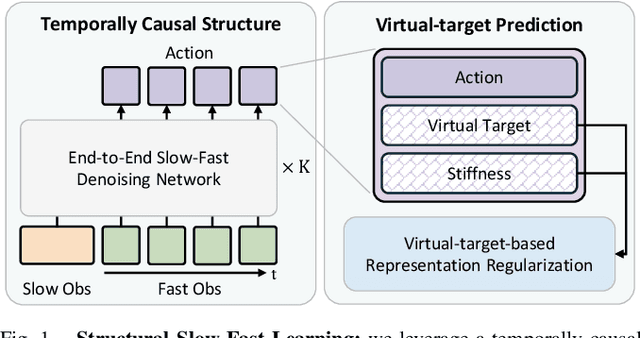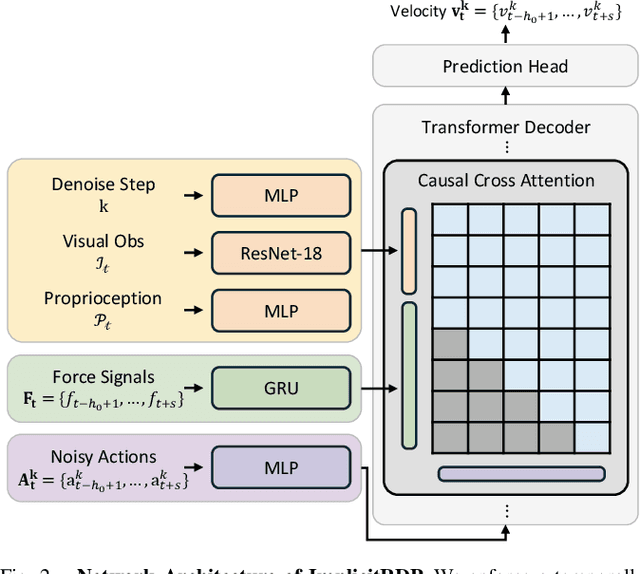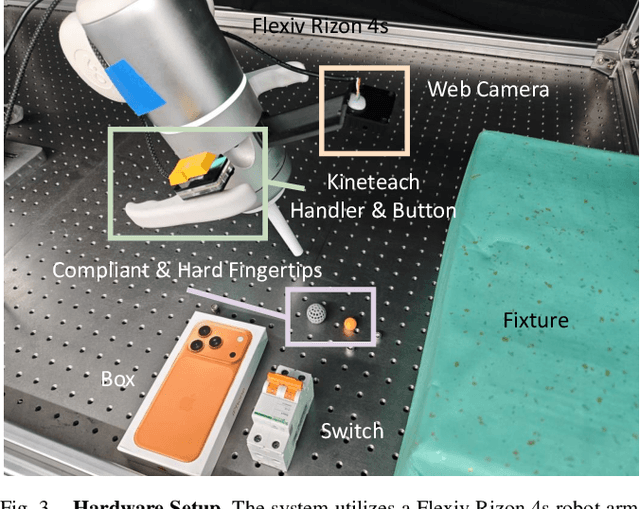Wendi Chen
ImplicitRDP: An End-to-End Visual-Force Diffusion Policy with Structural Slow-Fast Learning
Dec 11, 2025



Abstract:Human-level contact-rich manipulation relies on the distinct roles of two key modalities: vision provides spatially rich but temporally slow global context, while force sensing captures rapid, high-frequency local contact dynamics. Integrating these signals is challenging due to their fundamental frequency and informational disparities. In this work, we propose ImplicitRDP, a unified end-to-end visual-force diffusion policy that integrates visual planning and reactive force control within a single network. We introduce Structural Slow-Fast Learning, a mechanism utilizing causal attention to simultaneously process asynchronous visual and force tokens, allowing the policy to perform closed-loop adjustments at the force frequency while maintaining the temporal coherence of action chunks. Furthermore, to mitigate modality collapse where end-to-end models fail to adjust the weights across different modalities, we propose Virtual-target-based Representation Regularization. This auxiliary objective maps force feedback into the same space as the action, providing a stronger, physics-grounded learning signal than raw force prediction. Extensive experiments on contact-rich tasks demonstrate that ImplicitRDP significantly outperforms both vision-only and hierarchical baselines, achieving superior reactivity and success rates with a streamlined training pipeline. Code and videos will be publicly available at https://implicit-rdp.github.io.
Right-Side-Out: Learning Zero-Shot Sim-to-Real Garment Reversal
Sep 19, 2025Abstract:Turning garments right-side out is a challenging manipulation task: it is highly dynamic, entails rapid contact changes, and is subject to severe visual occlusion. We introduce Right-Side-Out, a zero-shot sim-to-real framework that effectively solves this challenge by exploiting task structures. We decompose the task into Drag/Fling to create and stabilize an access opening, followed by Insert&Pull to invert the garment. Each step uses a depth-inferred, keypoint-parameterized bimanual primitive that sharply reduces the action space while preserving robustness. Efficient data generation is enabled by our custom-built, high-fidelity, GPU-parallel Material Point Method (MPM) simulator that models thin-shell deformation and provides robust and efficient contact handling for batched rollouts. Built on the simulator, our fully automated pipeline scales data generation by randomizing garment geometry, material parameters, and viewpoints, producing depth, masks, and per-primitive keypoint labels without any human annotations. With a single depth camera, policies trained entirely in simulation deploy zero-shot on real hardware, achieving up to 81.3% success rate. By employing task decomposition and high fidelity simulation, our framework enables tackling highly dynamic, severely occluded tasks without laborious human demonstrations.
Reactive Diffusion Policy: Slow-Fast Visual-Tactile Policy Learning for Contact-Rich Manipulation
Mar 04, 2025Abstract:Humans can accomplish complex contact-rich tasks using vision and touch, with highly reactive capabilities such as quick adjustments to environmental changes and adaptive control of contact forces; however, this remains challenging for robots. Existing visual imitation learning (IL) approaches rely on action chunking to model complex behaviors, which lacks the ability to respond instantly to real-time tactile feedback during the chunk execution. Furthermore, most teleoperation systems struggle to provide fine-grained tactile / force feedback, which limits the range of tasks that can be performed. To address these challenges, we introduce TactAR, a low-cost teleoperation system that provides real-time tactile feedback through Augmented Reality (AR), along with Reactive Diffusion Policy (RDP), a novel slow-fast visual-tactile imitation learning algorithm for learning contact-rich manipulation skills. RDP employs a two-level hierarchy: (1) a slow latent diffusion policy for predicting high-level action chunks in latent space at low frequency, (2) a fast asymmetric tokenizer for closed-loop tactile feedback control at high frequency. This design enables both complex trajectory modeling and quick reactive behavior within a unified framework. Through extensive evaluation across three challenging contact-rich tasks, RDP significantly improves performance compared to state-of-the-art visual IL baselines through rapid response to tactile / force feedback. Furthermore, experiments show that RDP is applicable across different tactile / force sensors. Code and videos are available on https://reactive-diffusion-policy.github.io/.
DeformPAM: Data-Efficient Learning for Long-horizon Deformable Object Manipulation via Preference-based Action Alignment
Oct 15, 2024Abstract:In recent years, imitation learning has made progress in the field of robotic manipulation. However, it still faces challenges when dealing with complex long-horizon deformable object tasks, such as high-dimensional state spaces, complex dynamics, and multimodal action distributions. Traditional imitation learning methods often require a large amount of data and encounter distributional shifts and accumulative errors in these tasks. To address these issues, we propose a data-efficient general learning framework (DeformPAM) based on preference learning and reward-guided action selection. DeformPAM decomposes long-horizon tasks into multiple action primitives, utilizes 3D point cloud inputs and diffusion models to model action distributions, and trains an implicit reward model using human preference data. During the inference phase, the reward model scores multiple candidate actions, selecting the optimal action for execution, thereby reducing the occurrence of anomalous actions and improving task completion quality. Experiments conducted on three challenging real-world long-horizon deformable object manipulation tasks demonstrate the effectiveness of this method. Results show that DeformPAM improves both task completion quality and efficiency compared to baseline methods even with limited data. Code and data will be available at https://deform-pam.robotflow.ai.
 Add to Chrome
Add to Chrome Add to Firefox
Add to Firefox Add to Edge
Add to Edge